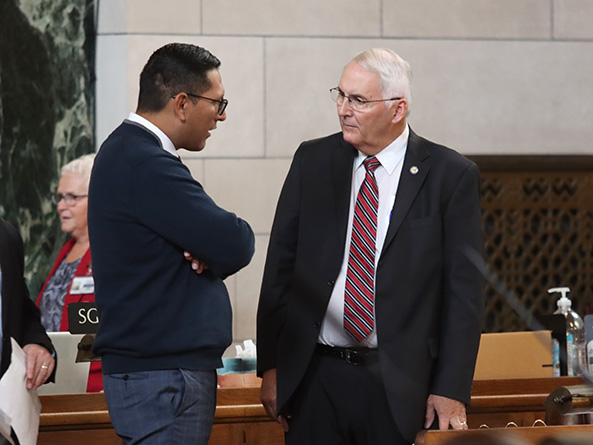Budget reductions clear first round after cloture vote
Lawmakers advanced a bill from general file Aug. 14 that makes adjustments to the state budget that was finalized in the recently concluded regular legislative session.

LB2, as introduced by Elmwood Sen. Robert Clements at the request of Gov. Jim Pillen, would reduce reappropriated general funds — also known as carryover funds — by $116.7 million across more than 40 state agencies in the current fiscal year and FY2024-25.
The governor’s proposal also would reduce base general fund appropriations by approximately $83 million, some of which would be offset by cash fund transfers.
An Appropriations Committee amendment would reduce the reappropriations to $75.68 million in general funds and $6.5 million in cash funds. It also would lower general fund appropriation cuts to $41.46 million, of which $360,567 would be offset by revolving fund increases.
Among the proposed reappropriations outlined in the governor’s proposal but not included in the committee amendment are:
• $250,000 from the Foster Review Office;
• $250,000 from the Election Administration program under the Nebraska Secretary of State’s Office;
• $1.3 million from the Veterans’ Affairs program;
• $5 million from the Broadband Bridge program under the Nebraska Public Service Commission;
• $6.6 million from several programs under the Crime Commission; and
• $25 million from various programs under the state Department of Health and Human Services.
In total, the amendment would reduce funds available to state agencies by approximately $120 million.
Clements said the committee carefully reviewed all of the governor’s proposed changes and made sure to not cut any agency “to the bone.” Committee members focused on unspent funds, he said, which totaled in the millions for many agencies.
“The key was not taking away 100% of the unused dollars of any agency,” Clements said.
Several senators expressed concerns regarding a $15 million cut to the state Department of Health and Human Services administration funds that was retained in the committee amendment.
Omaha Sen. Tony Vargas said the committee was not given any specific information regarding where efficiencies would be found to prevent that cut from impacting the department’s functioning. Committee members instead were offered only broad assurances that services to vulnerable Nebraskans would not be impacted, he said.
Other senators argued that none of the proposed cuts are necessary to provide sufficient funding for property tax relief that lawmakers are expected to approve during the special session.
Calling the cuts “primarily performative,” Lincoln Sen. Danielle Conrad said senators could make any necessary adjustments to state agency funding during the regular two-year budgeting process that will start in January.
The current two-year budget is balanced, she said, and a new group of lawmakers should take up the issue of continuing to fund property tax relief in the future.
“There’s absolutely no reason to move forward with any of the provisions in these bills,” Conrad said.
She and Omaha Sen. Machaela Cavanaugh filed a series of motions and amendments to extend debate on the bill. During the course of that debate, lawmakers rejected two proposed changes to the committee amendment.
An amendment offered by Lincoln Sen. George Dungan would have removed the DHHS funding cut. He acknowledged the committee’s work to ensure that direct funding to services was not impacted under their proposal, but expressed concern that administrative cuts could indirectly impact service provision for developmental disabilities, behavioral health, child welfare and juvenile justice.
“So, to reduce the amount of money available to DHHS without fully understanding … what the effect is going to be puts us in a problematic situation,” Dungan said.
Sen. Anna Wishart of Lincoln supported the amendment, saying any unspent DHHS funds could and should be reinvested in efforts to improve or expand services to vulnerable Nebraskans.
Bayard Sen. Steve Erdman opposed the amendment. He said the committee’s proposal only would take funds the department has not used and that otherwise would “just sit” in an account.
“[That money] belongs back to the people who put it there,” Erdman said. “That’s what we’re trying to do.”
The Dungan amendment failed 13-32.
Another amendment, offered by Cavanaugh, would have eliminated the reappropriation of $3.5 million from the Legislative Services program.
Grand Island Sen. Raymond Aguilar, chairperson of the Executive Board, supported the amendment. He said the Legislature often has unforeseen expenses that the reserve is used for, including technology upgrades and complications from the ongoing Capitol HVAC project.
Conrad also supported the amendment, citing the need for the Legislature to retain sufficient funds to fulfill its role as an independent, coequal branch of state government.
Sen. Kathleen Kauth of Omaha opposed the Cavanaugh amendment, saying she was “shocked” that lawmakers would provide the Legislature a cash reserve that no state agency enjoys rather than hold the institution to the same standard.
“That money needs to go back to the citizens of the state,” Kauth said.
The Cavanuagh amendment failed on a vote of 20-24. Twenty-five votes were needed.
After eight hours of general file debate, Clements offered a motion to invoke cloture, which ends debate and forces a vote on the bill and any underlying amendments. The motion succeeded on a 34-10 vote, one vote more than required.
Lawmakers then approved the committee amendment 40-4 and voted 33-11 to advance LB2 to select file.


